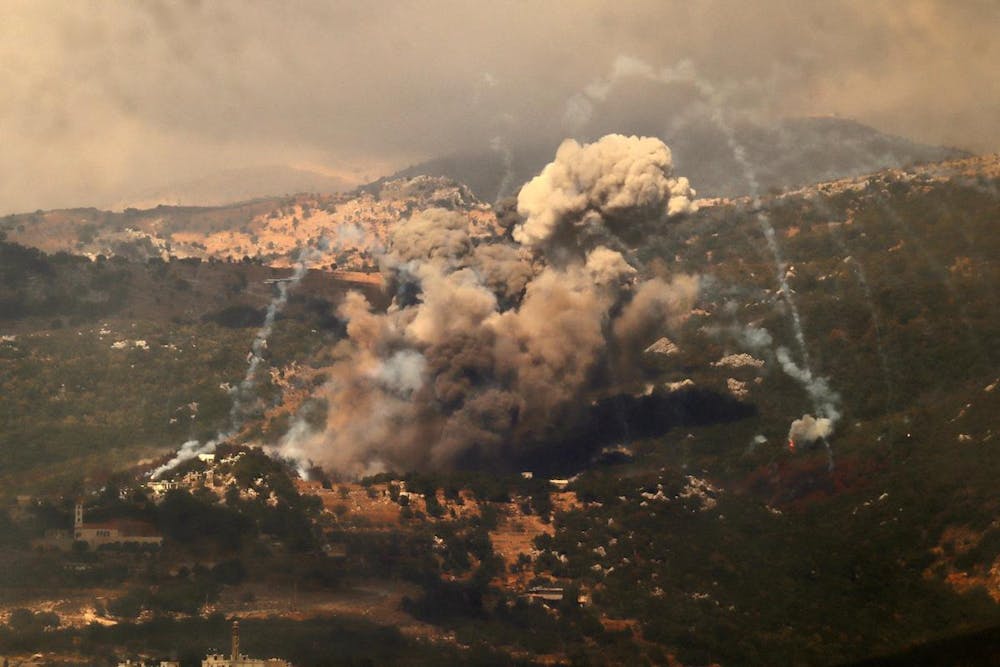The source “Maria,” located in France, was interviewed by Enoch Eicher by video call. The name, title and any other identifying characteristics of the source “Maria” have been excluded for safety reasons – Editor.
Conflict in Lebanon continues as the war between the Israeli Defence Force and Lebanese militant group Hezbollah enters its second year.
Hezbollah's and Israel's previously intermittent cross-border conflict intensified in October 2023 when the Lebanese militant group opened fire on Israeli targets in support of Hamas in Gaza.
The Levantine country that shares a southern border with Israel was thrust back into the midst of the conflict after Israel claimed that Hezbollah was behind an attack on the Israel-occupied Golan Heights.
Maria has seen it all. She grew up in the capital city of Beirut in a Maronite Christian family. In 2012, Maronites constituted 31% of Lebanon's population, according to estimates.
She is young enough to have not witnessed the decades of hostility between Hezbollah and Israel, which began with the Israeli invasion of Lebanon in 1982.
Israel's occupation of Lebanon sparked opposition from a number of Lebanese factions, especially the Shia community, who opposed its plans to expel the Palestine Liberation Organization (PLO) and establish a friendly government.
During this period, Iran-backed resistance group Hezbollah was formed with the goal of rebuffing Israeli forces. Hezbollah has carried out a number of attacks on Israeli military and civilian targets over the years.
The most well-known of these attacks was the 1983 bombing of French and American peacekeepers in Beirut, which is commonly credited to the organization.
Maria witnessed the 2006 July War, triggered by Hezbollah's capture of two Israeli soldiers.
“My cousins from France were visiting, and I remember hiding in the underground parking space of my building,” Maria said.
Her family moved to a remote part of Lebanon for a month during that time to escape the conflict and only moved back home to Beirut when the peace treaty was signed.
That conflict resulted in significant casualties, with over 1,200 Lebanese, mostly civilians, and 158 Israelis, primarily soldiers, killed.
In the current conflict in Lebanon, 97,000 people have been forced from their homes, with 2792 people killed, according to the Lebanese Ministry of Health. More than 12,000 were reported as well.
About 60,000 Israelis were evacuated from the border region of neighboring northern Israel according to the Associated Press.
Based in France now, Maria is observing the war in Lebanon from a distance but is watching closely as her parents still live in Beirut. Israel is regularly sending airstrikes into Lebanon and more than 3,600 buildings appear to have been damaged or destroyed between October 2 and 14,2024, according to the BBC.
Lebanon is a country characterized by significant religious and sociological diversity, shaped by its historical and geographic position in the Middle East.
The nation officially recognized 18 religious sects, with the largest groups being Christians, Muslims and Druze. Christian communities include Maronite Catholics, Greek Orthodox and Armenian Apostolic Christians, with the Maronite Church playing a particularly influential role.
The Muslim population is divided mainly between Sunni and Shia groups. The Druze, a distinct religious group with roots in Islam, are largely based in the Chouf mountains and southern areas.
In the aftermath of the events on Oct 7, views among Christians in Lebanon regarding Hezbollah have become increasingly divided. Maria provided insight into the current perceptions and the historical context of the militant group.
“Amongst Christians, I would probably say most people don’t necessarily like Hezbollah in general,” Maria said. However, she acknowledged that opinions vary widely. “There are still people that think they’re resistance, not terrorists, and then there are people that think they’re terrorists, and they should absolutely disappear.”
She observed a spectrum of attitudes toward Hezbollah.
“You’re going to get extremes, with people being really happy that they’re being completely eradicated.”
She said that it reflects a significant division within the community, with some considering Hezbollah’s history as a resistance movement while others criticize their current actions as the reason for the conflict in the country that is putting innocent lives in danger.
“I think peace is available for a short time,” Maria said. “But they will not be able to wipe out Hezbollah.”
She said with many people seeing Hezbollah as a resistance movement, the killing of its fighters motivates more to join the cause.
Maria pointed out a broader sentiment among her generation regarding political parties in Lebanon.
“Most people don’t really like any political parties,” she explained, attributing this to a general disillusionment with existing leadership. “Especially during my time at uni as well, they’re (students) still politically affiliated, but most people are really against political parties.”
She emphasized a growing detachment from traditional political affiliations: “Little by little, the view on political parties started shifting more to not liking any parties.”
When asked about what she thought the solution was to the conflict, she grew quiet. Her face seemed to shrink. “I don’t know,” she finally said.
United States envoy Amos Hochstein says Washington is looking to end the war in Lebanon “as soon as possible,” stressing that the US is seeking a lasting resolution to the crisis, according to Al Jazeera.
But despite international calls for peace, Hezbollah remains staunchly opposed to Israel, viewing resistance as a key part of its identity.





